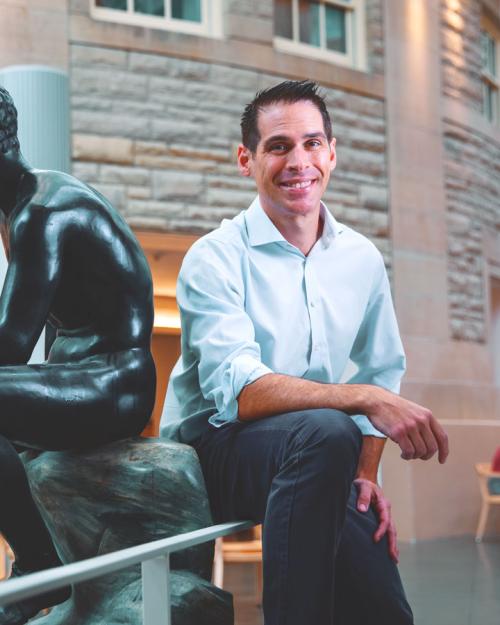Most of us like to think there are hard and fast rules about morality. Certain actions are obviously wrong, we argue. But consider the following scenario: A criminal holds a gun to a man’s head and says that the man must kill his neighbor or be killed himself. Under threat, the man goes ahead and kills his neighbor. Should he be held responsible for what he did, considering that he had no choice? What if he were willing to do it? What if he enjoyed doing it?
“The classic excuse is that he couldn’t have done otherwise, so he’s not culpable. But that doesn’t work in this situation,” says John M. Doris, Applied Economics and Management/Philosophy. “It doesn’t matter that he was forced to kill his neighbor. People will still hold him to blame if he was enthused or identified with what he did. The moral judgment comes apart from the causal judgment. It tracks the attitude, not the causation.”
Findings like this one intrigue Doris. Trained in philosophy, he is one of the founders of moral psychology, a new interdisciplinary field that explores the psychological determinants of moral judgment and behavior. Moral psychology brings together philosophy, psychology, and fields from across the sciences and humanities in an attempt to identify the deepest workings of human nature.
In 2010, the Moral Psychology Research Group, an interdisciplinary group of philosophers and psychologists that Doris cofounded, put out a moral psychology handbook that surveyed the field. “I think it had 13 chapters and ran 470 pages,” Doris says. In 2022, Doris and Manuel Vargas coedited a new survey, The Oxford Handbook of Moral Psychology (Oxford University Press, 2022). “The new handbook has 50 chapters and 1100 pages,” he says. “That’s a measure of how much the field has grown.”
Bad Person versus Bad Situation
Doris recently worked with Laura Niemi, Psychology, and Jesse Graham (University of Utah) to explore the extent to which people think of moral transgressions as a function of the character of the person who commits the transgression versus the situation the person is in. The researchers found that two factors influence whether we attribute bad moral behavior to the individual or the situation. One is the nature of the transgression itself. The other is our relationship with the perpetrator.
“These two features—our relationship with the perpetrator and the values the perpetrator violated—influence how we understand moral transgressions.”
“Conservatives tend to care more about loyalty and authority,” Doris says. “Liberals care more about preventing harm and fairness. Say I see an employee joking with a competitor about how badly the employee’s company did last year. That’s a loyalty issue. If I care about loyalty, I’m more likely to attribute the employee’s actions to their personal disposition; I might say they’re disloyal or an untrustworthy person. If I don’t care so much about loyalty, I’m more likely to attribute it to their circumstance; I might say their boss treats them badly, for instance.”
But there’s another wrinkle in the picture. By attributing the cause of a transgression to the situation rather than blaming the individual, the judger is essentially giving the transgressor a pass. And as human beings, we are more inclined to excuse those we know.
“If I do something wrong or my friend does something wrong, then I might attribute it to the situation,” Doris says. “But if a stranger does something wrong, I’m more likely to attribute the transgression to the person. These two features—our relationship with the perpetrator and the values the perpetrator violated—influence how we understand moral transgressions. This suggests moral judgment is in the service of preserving our affiliations, our group ties.”
Telling Stories
Doris also looks at rational failures, the tendency of people to do things for non-reasons or to create stories to explain their own behavior. In Talking to Our Selves: Reflection, Ignorance, and Agency (Oxford University Press, 2015), he explored how people shape their lives by telling each other stories that aren’t necessarily true. “There’s no question we have an incredible facility for cooking up sensible-seeming explanations for how we act,” he says. “I’m not saying we are consciously lying. I think we do it unconsciously.”
Doris mentions the explanations people give for how they ended up with their spouse or partner. Many say that they knew immediately they were meant for each other. The truth is perhaps much more mundane or even murky, Doris explains. Perhaps meeting the other person was a nonevent but going on a date with them seemed better than sitting at home.
“With the ‘we knew right away’ story, you’re celebrating the other person,” Doris says. “You’re celebrating your relationship. You’re saying, ‘Anyone who laid eyes on your father would have known what a great catch he was.’ Compare that with what may be the truth: ‘I hadn’t had a date in seven months, and I thought your father would do.’”
Humanizing Our Moral Limitations
Doris hopes his work, and the work of moral psychologists in general, will help us all realize the limitations of our human existence. “It’s worth knowing that the Western humanist tradition of human beings as rational animals doesn’t stand up well to scientific scrutiny,” he says. “Here’s the humanizing revelation: we’re all rationally and morally fragile, and ‘That, but for the grace of God, do I.’”




